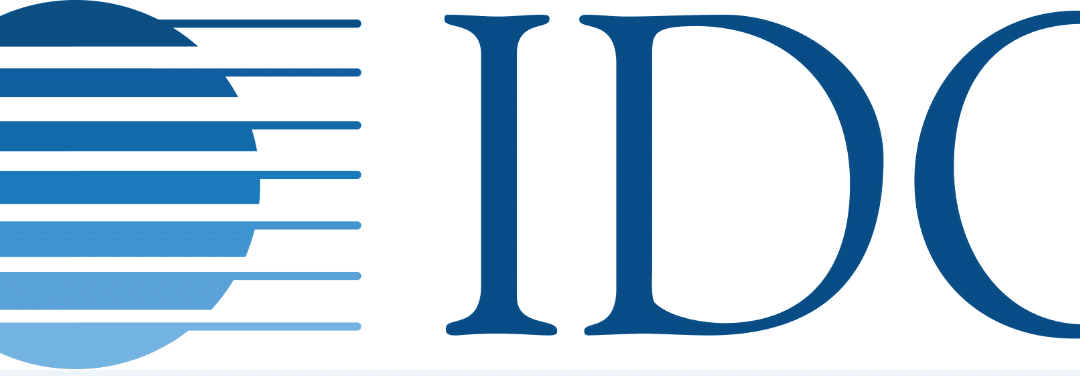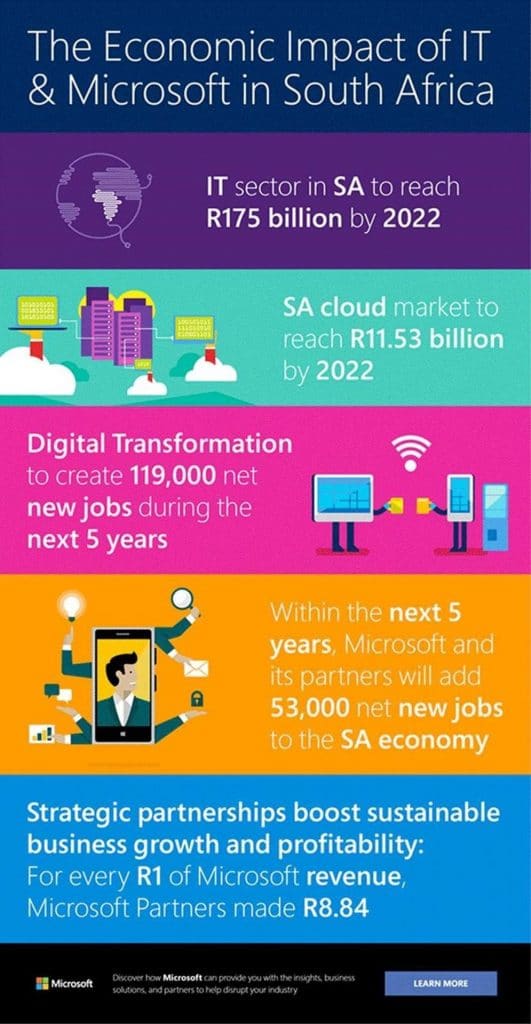A new study by data analytics firm IDC is finding that digital transformation in the era of intelligent cloud and intelligent edge will enable organisations to create new jobs, with the IT sector in South Africa expected to create as much as 119,000 net new jobs over the course of the next five years.
Moreover, the IT sector in South Africa is expected to grow at a five year compounded annual growth rate (CAGR) of 4.25% to reach R175 billion by 2022. Fuelling this growth is the fact that every part of our economy and our society, whether it’s precision agriculture or precision medicine, is being shaped by the advances in digital technology. In fact, the cloud market expected to reach R11.53 billion by 2022, representing a CAGR of a whopping 21.9%. This means that computing is becoming more powerful and ubiquitous from the cloud to the edge, while AI capabilities and machine learning are rapidly advancing our knowledge of the world.
According to the report, entitled Economic Impact of IT & Microsoft in South Africa, the increased utilisation of public cloud services and the additional investments into private and hybrid cloud solutions will enable organisations in South Africa to focus on innovation and accelerate the pace of digital business transformation. In turn, this enablement will help businesses generate close to R81 billion in net new revenues over the next five years.
“A huge amount of data is being created, and advancements in data analytics, machine learning and predictive analytics combined with new, rich computing experiences are driving a new era of working – new ways and insights on how to engage with customers, empower employees, optimise operations and transform business models ,” says Zoaib Hoosen, Managing Director at Microsoft South Africa.
Enter era of intelligent cloud and the intelligent edge
By 2020, it’s estimated that there will be 30 billion connected devices, according to the IDC research group, with many people using multiple devices during the course of a day. The ability to move experiences from device to device requires us to orchestrate these devices using the cloud as the control plane.
The intelligent edge will become the interface between the computer and the real world, enabling companies to gather significant amounts of data, extrapolate a lot of invaluable as well as actionable business insights from the data, and apply AI to enhance workplace safety, security and productivity.
However, doing so demands a huge amount of responsibility in terms of ensuring that access to these services is democratised more broadly across society and that the technologies we create are trusted by the individuals and organisations that use them.
To deliver upon this promise of responsibility, there are three key local initiatives through which Microsoft and its partners are ensuring technology’s benefits reach more people. Firstly, Microsoft partners with companies developing solutions that enable internet connectivity and energy access in underserved communities. For instance, there are currently two key projects within Limpopo and Eastern Cape that leverage TV White Space technology to provide affordable access to the community, schools and public clinics amongst others.
Secondly, the company continues to invest in increasing the access to digital skills in South Africa. The past year alone, Microsoft has invested more than $ 2.8 million in education and skills development in South Africa. To date, the company has trained more than 8,000 teachers enabling them to leverage technology in the classroom and ensure learners gain 21st Century skills they require to be successful in their future workplace.
Thirdly NGO investments, which sees Microsoft providing software and cash grants to non-profits in South Africa, because of the company’s belief that technology has the power to help these organisations address some of the country’s most challenging issues. Recently, Microsoft announced the Thint’iMillion Platform, in partnership with Gauteng Provincial Government, which is an online mass learning system that will initially focus on enabling young people to access digital skills training through various different community centres.
Creating the most trusted cloud for all
Microsoft views privacy as a fundamental human right and as such, the company is working hard to ensure compliance with key privacy enactments, such as GDPR and eventually POPI Act. Furthermore, the company believes that no company is able to solely keep the world safe from cybercrime. Consequently, Microsoft has led bold new cross-industry initiatives, like the Cybersecurity Tech Accord, and have called on governments to do more, through initiatives such as a Digital Geneva Convention.
Another huge ingredient in the trusted computing recipe is taking the steps needed to ensure that AI works in an ethical and responsible way. How? By working to ensure that our company translates our industry-leading research in this area into broadly implementable tools and guidance that everyone can leverage, and ensure that people and businesses around the globe are leveraging AI to augment human capability.
Empowering the digital opportunity in South Africa
In order for South Africans and local organisations to be able to capitalise on all the capabilities and services mentioned able, they require the infrastructure and tools from within the country. Microsoft is opening two local data centre regions, in Cape Town and Johannesburg, by the end of this year. This will bring the Microsoft Cloud to South Africa, along with all the benefits that entails including data residency, enabling industries that are required by regulation to keep certain data within the borders of South Africa, to move to the cloud, and realise the benefit.
As a result of the increased adoption of cloud services in South Africa, 53 000 new jobs opportunities will be created in the economy. Microsoft has already created the platforms through which companies can prepare their staff and people can gain the technical skills required to fill these posts for free through platforms such as Cloud Society. Besides upskilling staff, these platforms enable businesses to create value for their customers and maintain a competitive advantage in a digital-first world.
In addition, Microsoft’s local investment to build a strong partner network in South Africa is empowering local businesses to create innovative local offerings. For every Rand that Microsoft generated, its partners managed to deliver downstream revenue of R8.84. The capable ecosystem is allowing Microsoft to deliver on its mandate to empower every South African and local business to achieve more.



